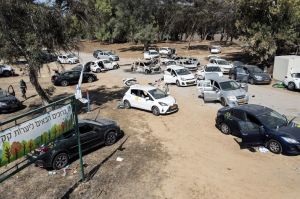Double-I Factor: The Pew Report and Underestimating the Kingdom of God
Christianity, it seems, is on the decline in the United States, according to the Pew Research Center's much ballyhooed analysis of the U.S. religious landscape.

I have spent enough years in politics — from presidential races to local office elections — to not discount polls. At the same time, however, I have observed the hubris in which researchers believe their work is accurate to the point of near-infallibility.
Take for instance in 1968, Stanford professor Paul Ehrlich, with his wife, Anne, wrote The Population Bomb. Their research showed that planetary overcrowding would lead to widespread starvation in the 1970s and 1980s. "The battle to feed all of humanity is over," they claimed. "Nothing," they grimly declared, "can prevent a substantial increase in the world death rate" in the 1970s and '80s.
"Goodbye winter. Never again snow?" So read a hand-wringing line in Der Spiegel, a major German newsmagazine in April, 2000. Global warming would cause winters like those of the past to "cease to exist at our latitudes," according to an expert at Max Planck Institute.
And Texas A&M prognosticators thought the state's worst-ever 2011 drought could stretch out as far as 2020. "Texas Drought Fades With Heavy Rains," said a May 18 headline in the Houston Chronicle. The rains had returned in late summer 2013.
And just this month, "The U.K. elections give polling a black eye," opined the Huffington Post after Prime Minister David Cameron and his Conservative Party won a clear majority May 7. Pollsters right up to the wire were reporting the outcome would be tight and unclear.
The problem for pollsters may not be so much a "black eye" as the "Double-I Factor," the presence of potential spoilers for all polling and metric-based research projects — the (at the moment of polling) "Invisible" and (at the moment of polling) "Immeasurable."
I have seen individuals and institutions suffer because the Double-I Factor was ignored.
There are two reasons polls get it wrong. First, they measure only what can be observed at the moment. That means deeply underlying trends that can sprout suddenly and warp the data remain invisible. Second, such factors usually exist only in the abstract until their impact is observable, and they are therefore immeasurable until that point.
The Pew Center tried to measure, according to the title of its report, the nation's "Religious Landscape." I like that because it reminds me of a day Jesus also talked about the "landscape," describing the Double-I Factor beautifully. Here's what He said, as recorded in Mark 4:26-29 (AMP):
The kingdom of God is like a man who scatters seed upon the ground, and then continues sleeping and rising night and day while the seed sprouts and grows and increases — he knows not how. The earth produces [acting] by itself — first the blade, then the ear, then the full grain in the ear. But when the grain is ripe and permits, immediately he sends forth [the reapers] and puts in the sickle, because the harvest stands ready.
The Kingdom of God is invisible and immeasurable until its impact is observable and measurable in the form of its "fruit." This is why the biblical Church has so often been underestimated. History is loaded with examples of nations who thought they had that tiny seed rooted out. In many societies the Church with its Kingdom vision has been inconsequential and ignored until those at the top begin to see transformation occurring at the bottom, on the surface of the "landscape."
It is true there is a kind of Christianity that is shrinking from the American landscape. It is that whose theology is a copycat of the worldview of the contemporary cultural consensus. It has lost its passion for Christ as the world's Redeemer and imposed in His place all manner of human-centered routes to salvation.
We should not ignore the Pew Report, but neither should we despair. The church must, however, allow it to inspire certain positive actions:
• Reaffirmation of the authority of the Bible
Evangelical stability and strength were among the positive findings of the Pew study, and Evangelicals "now constitute a clear majority of all US Protestants." This would seem to affirm Evangelical Christianity's high view of the Bible's inspiration and scriptural authority.
• More intentionality and creativity in evangelism and missions
There is a trend that could produce different results for Evangelicals in years ahead, and that is a decline in baptisms among big denominations like the Southern Baptists. The Pew Report and other data should spark a new urgency for reaching the culture for Christ.
• Unapologetic passion for Christ and humanity
Affluent societies tend to produce Laodicean lukewarmness in churches. In contemporary society the "selfie" mentality has invaded even evangelicalism, and may be a negative Double-I Factor whose results may be evident in polls a decade from now. Passionate worship of God and ministry to people directs a church away from self-absorption, and is essential to the health of future-church.
• Prayer for the Church in America and the nation itself
There's no room to smirk here at denominations that are shrinking. Rather, there should be concerted intercession for all the Church in America.
As important as the Pew Report is — and as flawed as it may be — the focus must not be on the weakness of the church, but the inevitable manifestation of God's Kingdom of goodness, peace, and love in a world poisoned by evil, conflict, and hate, and the Church's mission in that enterprise.
It is that unseen Kingdom dynamic that the pollsters miss but which others "see" with "the eyes of faith."





























